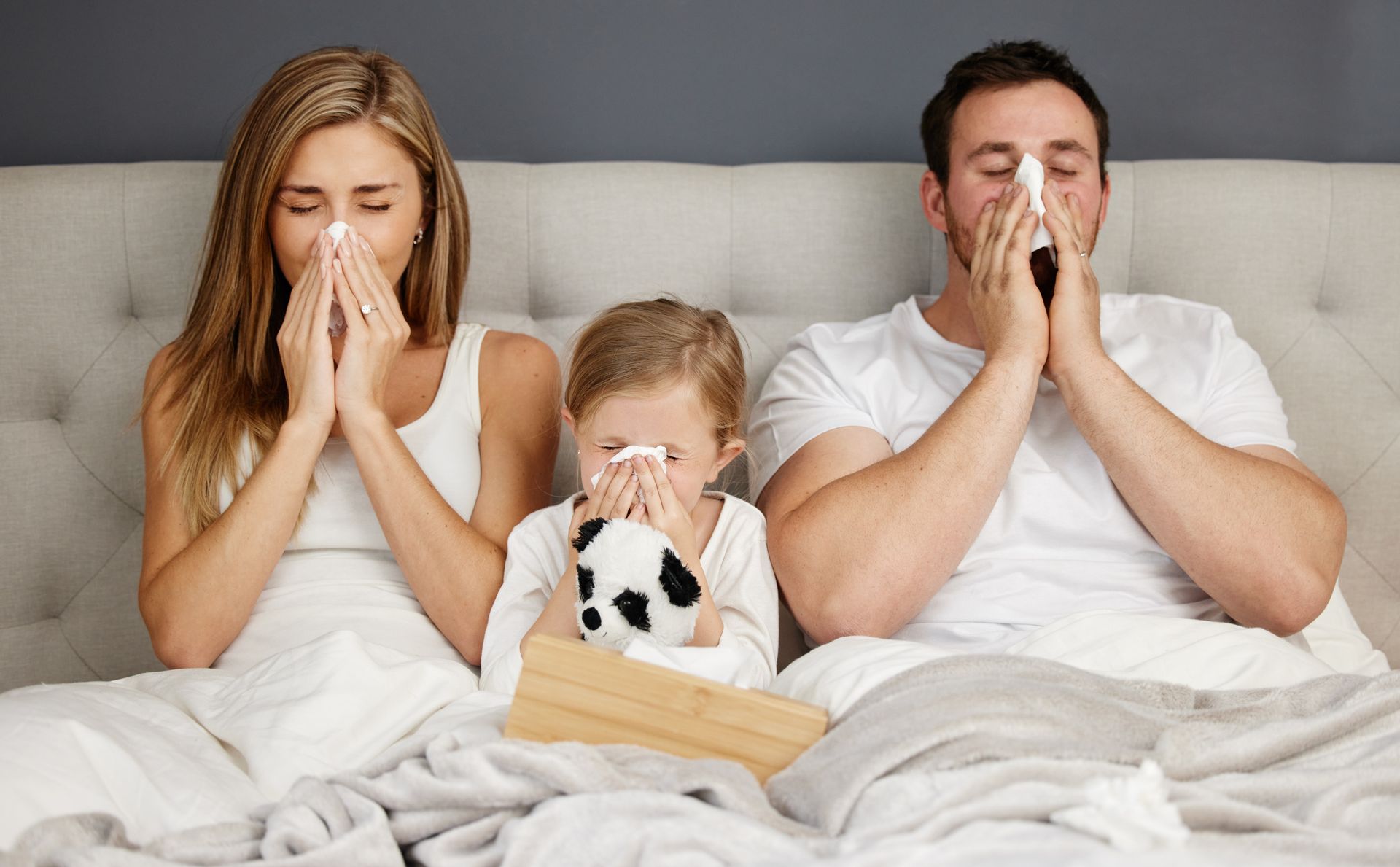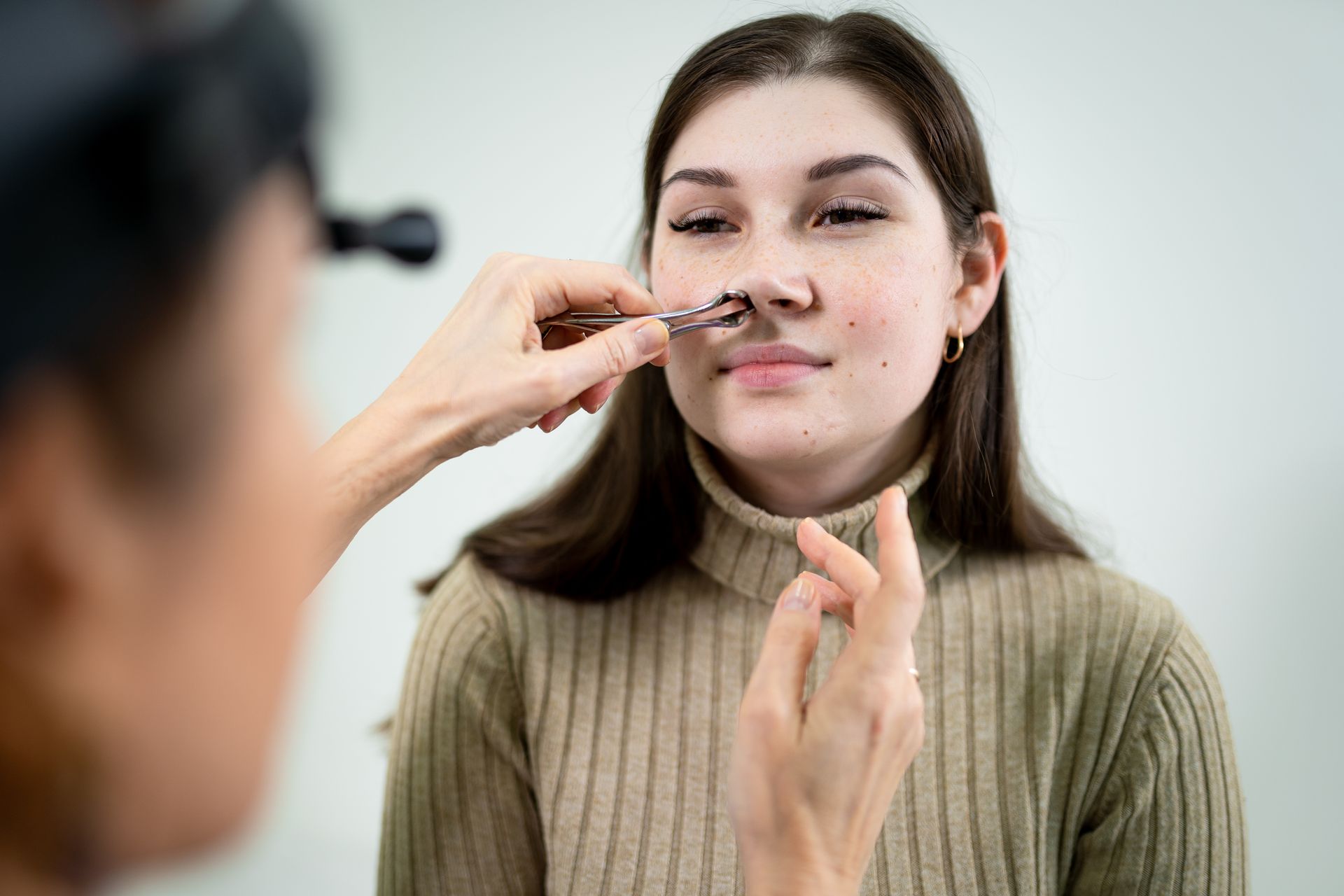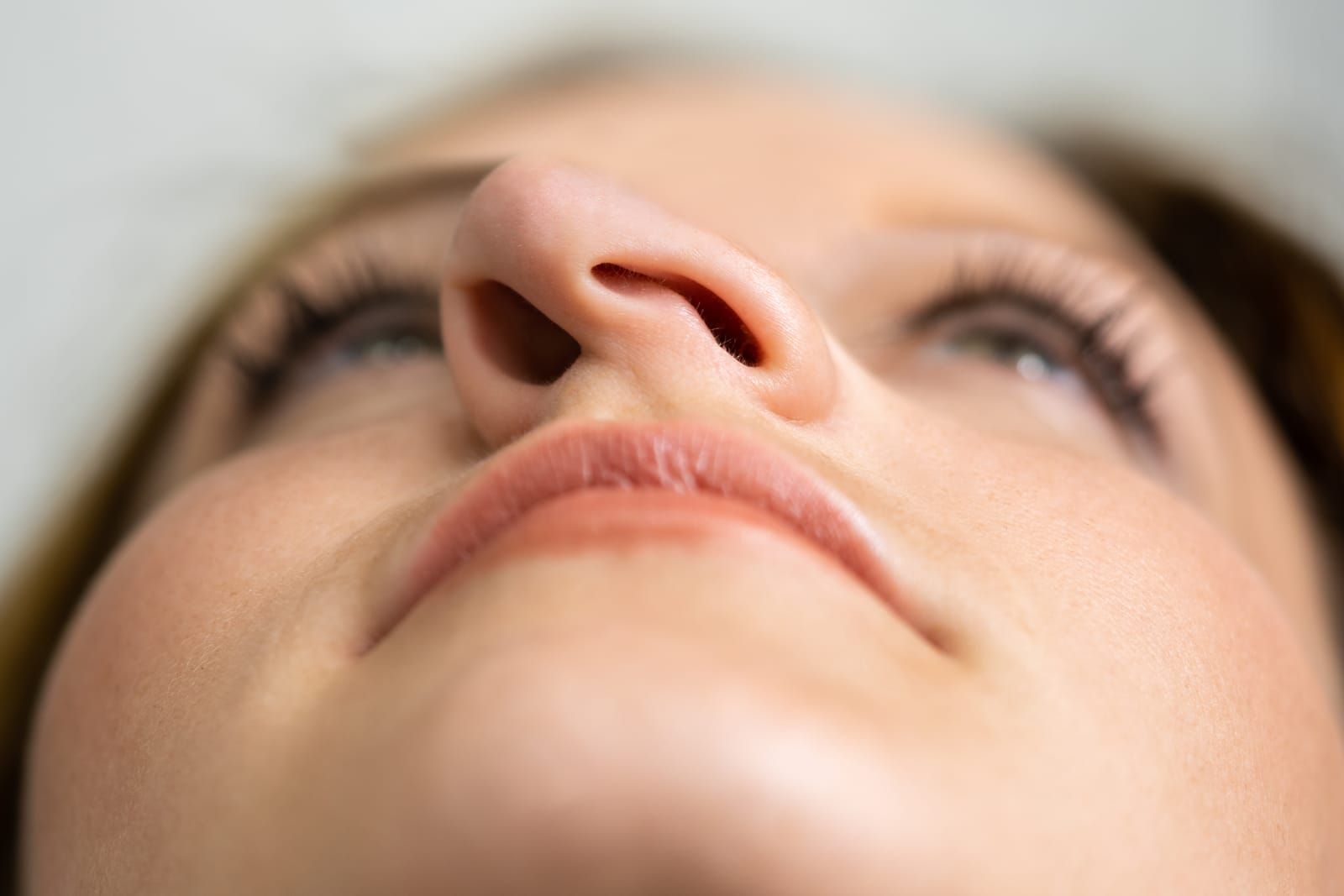ENT Allergies in Louisville: Symptoms, Testing, and Relief Options
ENT Allergies in Louisville: Symptoms, Testing, and Relief Options

Did you know that Louisville residents experience 40% more respiratory allergy symptoms than the national average? This is because our city's location in the Ohio River Valley traps allergens all year. It's a perfect storm for allergies.
Dealing with ear, nose, and throat allergies in Louisville is tough. The humid weather and our valley location keep pollen and mold in the air. This makes it key to see a ENT allergy specialist for relief.
We know how allergies can ruin your day. They can mess up your sleep, make you less productive, and cause constant discomfort. Our guide will show you how to find lasting relief through Louisville's top care centers.
We'll cover how to find out what's causing your allergies and the latest testing methods. Louisville's experts offer treatments that fit Kentucky's unique seasons and geography. They help you find the right path to feeling better.
Key Takeaways
- Louisville's Ohio River Valley location creates 40% higher allergy rates than national averages
- Humid climate and geography trap allergens year-round, requiring specialized care
- Professional ENT specialists offer advanced diagnostic testing for accurate identification
- Personalized treatment plans address regional environmental triggers effectively
- Early intervention prevents complications and improves long-term quality of life
- Modern allergy management combines testing, treatment, and lifestyle modifications
Understanding ENT Allergies and Their Impact on Daily Life
ENT allergies are more than just a seasonal nuisance for people in Louisville. They affect the ear, nose, and throat areas. This can change how we live our daily lives.
When our immune system reacts to certain triggers, ENT allergies develop. Pollen, dust mites, mold spores, and pet dander can cause inflammation. This inflammation often spreads to other areas.
ENT allergies can lead to a series of symptoms. Nasal congestion makes us breathe through our mouth, drying the throat. Blocked sinuses can affect ear pressure, causing hearing and balance problems. An experienced allergist in Louisville can help understand these issues.
Many people don't realize how bad untreated ENT allergies can be. The effects go beyond just feeling uncomfortable:
- Sleep disruption from nasal congestion and throat irritation
- Reduced cognitive function due to poor sleep quality and constant discomfort
- Decreased work performance from fatigue and difficulty concentrating
- Social limitations caused by chronic coughing, throat clearing, and voice changes
The ENT system is connected, so inflammation in one area can affect others. A simple nasal allergy can turn into chronic sinusitis, ear pressure, and throat irritation. Getting professional help is key to stopping this cycle.
Managing allergies starts with knowing how they affect your ENT system. Professional diagnosis and treatment can help find and address the root causes. Working with a skilled allergist in Louisville ensures you get the right care.
Louisville's Unique Allergy Landscape and Environmental Triggers
Louisville's location at the crossroads of climate zones creates a complex allergy environment. The humid subtropical and continental weather patterns lead to extended allergy seasons. This means people often face allergies all year.
The mix of natural and human-made factors makes managing allergies tough. People need help from a sinus specialist louisville who knows the local challenges.
Seasonal Pollen Patterns in Kentucky
Kentucky's plants produce overlapping pollen seasons that last longer than usual. Tree pollens start in February and go through May. Oak, maple, and hickory are the main culprits.
Grass pollens hit their peak in late spring and early summer. Kentucky bluegrass, timothy, and fescue fill the air with pollen. This pollen sticks around until August.
Fall brings ragweed and weed pollens until the first frost. This means people face pollen almost all year. A skilled sinus specialist louisville is needed for year-round care.
Ohio River Valley Climate Effects
The Ohio River Valley's microclimate traps and intensifies allergens. Pollens and particles get stuck, unlike in flatter areas. Morning fog and high humidity keep allergens in the air longer.
Temperature inversions in the valley create allergen accumulation zones near the ground. This can make pollen counts 200-300% higher. The river adds moisture, perfect for mold growth, during floods and summer.
- Humidity levels above 60% help dust mites grow
- Temperature changes cause plants to bloom more
- Air stagnation stops allergens from clearing
- Floods create ideal mold conditions
Urban and Industrial Allergen Sources
Louisville's industrial past adds to our allergy problems. Chemical plants, car factories, and bourbon distilleries release harmful particles. These can make allergies worse, mixing with natural pollens.
The city's heat island effect makes trees and plants produce more pollen. Concrete and asphalt absorb heat, making pollen last longer. Construction also adds to the air pollution.
Traffic pollution makes things worse by irritating noses. Diesel exhaust particles carry pollen deeper into the lungs. This mix of urban and natural allergens needs special treatment.
Comprehensive Guide to ENT Allergy Symptoms
Understanding how allergies affect the ear, nose, and throat is key. Ear nose throat allergies often show up in many ways at once. This makes it important to look at all symptoms together to find the right treatment.
Our experience shows that symptoms in these areas often mix together. This means that treating one symptom can help others too. This way, we can find the best treatment for each patient.
Nasal and Sinus Manifestations
Nasal symptoms are the most common sign of ear nose throat allergies. Feeling stuffy can make it hard to breathe and sleep. Many people notice their nostrils get blocked more in certain seasons or when they're around certain things.
Clear, watery discharge usually means you have allergies. But if the discharge is colored, it might mean you have a secondary infection. Frequent sneezing episodes often happen in the morning or when you're in places that trigger your allergies.
Not being able to smell as well can really affect your life. This is because your nasal membranes are swollen. If you can't smell at all, you should see a doctor right away to make sure it's not something else.
Sinus problems can make your face feel tight. Frontal headaches get worse when you bend forward. Maxillary sinus pressure can make your cheeks and upper teeth hurt.
Post-nasal drip makes you want to clear your throat a lot. This gets worse when you're lying down at night. It can make your throat sore and disrupt your sleep.
Ear-Related Allergy Symptoms
Ear symptoms from allergies might surprise you. Eustachian tube dysfunction makes your ears feel full or like they're underwater. This can feel like being at high altitude.
Some people with allergies might hear things less clearly. Fluid buildup behind the eardrum can make sounds seem muffled. You might turn up the TV or ask people to repeat themselves.
Tinnitus, or ear ringing, can make it hard to focus and sleep. The sound can range from a soft buzz to a loud whistle. Allergies can make tinnitus worse or start it if you didn't have it before.
People with allergies often get ear infections more often. Blocked eustachian tubes make it hard for the ear to drain and ventilate. This is a perfect place for bacteria or viruses to grow.
Itching in the ear canal is a sign of an allergy. People often say it feels like the itch is deep inside. Trying to scratch it can irritate the skin or cause an infection.
Throat and Voice Changes
Throat symptoms from allergies can really affect how you talk and feel. Chronic throat clearing can irritate your vocal cords. This can lead to hoarseness.
Voice changes like hoarseness or a raspy voice are common. These changes are more noticeable for people who sing or speak a lot. Morning hoarseness often gets better as the day goes on.
Feeling like there's something stuck in your throat is uncomfortable. This feeling can make you swallow or clear your throat a lot. It's a sign that your throat is swollen.
Difficulty swallowing, or dysphagia, is serious. It happens when your throat gets very swollen. If you have trouble swallowing solid foods, you need to see a doctor right away.
Chronic coughing from post-nasal drip can really disrupt your life. It gets worse at night when you're lying down. Dry coughing fits can irritate your throat even more.
Keeping a symptom diary is very helpful. It helps us figure out what's causing your symptoms and when. This information is very important when we're planning your treatment.
Because the ear, nose, and throat are connected, treating one symptom can help others. A treatment plan that targets the root cause of your allergies is usually the most effective.
Distinguishing Allergies from Other ENT Conditions
It's a big challenge to tell if someone has an allergy or another ENT condition. Many symptoms look the same, making it key to get a correct diagnosis. The best ENT for allergies knows how to figure out what's really going on.
Getting a proper diagnosis means looking at symptoms, when they happen, and how they react to treatments. If we get it wrong, people can suffer for a long time. Knowing the difference helps patients get the right care and have the right expectations.
Bacterial and Viral Infections
Sinus infections are different from allergies. Bacterial sinusitis starts suddenly, with fever, pain, and thick, colored discharge. It often comes after a cold and needs antibiotics.
Allergic rhinitis, on the other hand, has clear discharge without fever or pain. It lasts longer than infections, weeks or months. Chronic sinusitis can make it harder to tell the difference because it can have allergies too.
The top ENT for allergies will look at discharge, how long symptoms last, and how they react to treatments. They might use nasal endoscopy or imaging to see if there's an infection or structural issues. This careful check helps find the right treatment.
Timing and Pattern Recognition
Seasonal allergies happen at the same time every year, triggered by things like pollen. We notice symptoms get worse in spring, summer, or fall. These seasonal patterns help us figure out what's causing the allergy.
Perennial symptoms mean allergies are present all year, often due to things like dust mites or pet dander. We look for symptoms that don't change with the seasons. Mixed patterns happen when someone has both seasonal and year-round allergies.
Knowing what's causing the allergy helps us treat it better. We look at how symptoms change when someone travels or moves. The best ENT for allergies uses this info along with test results to make a good treatment plan.
Getting a correct diagnosis takes time and careful checking. We use symptom diaries, tests, and trial treatments to sort out complex cases. This way, we can find out if someone has allergies or something else.
Modern Allergy Testing and Diagnostic Approaches
Comprehensive allergy testing helps find what causes ENT symptoms. We use advanced tech to create detailed profiles for each patient. This ensures accurate diagnosis and targeted treatment planning for the best results.
We use many testing methods to find all allergens. Each method has its own strengths in finding immune responses. Together, they give comprehensive results for personalized treatment plans.
Skin Testing Methods
Skin prick tests are the top choice for quick allergy detection. We apply small amounts of common allergens to your skin with sterile lancets. Results show up in 15-20 minutes, revealing reactions to specific triggers.
Intradermal testing is more sensitive for finding weaker allergic reactions. It involves injecting diluted allergens just under the skin. We use it when prick tests are unclear or for specific environmental allergens.
Our skin testing covers a wide range of regional allergens. We test for tree pollens, grasses, weeds, molds, and dust mites common in Kentucky. This region-specific approach helps us find all local triggers affecting your symptoms.
Blood-Based Allergy Panels
Specific IgE blood tests measure antibodies against individual allergens. These tests are great when skin testing isn't possible. We can do blood testing even with antihistamines or active eczema.
Component-resolved diagnostics is the latest in blood testing. It identifies specific protein components in allergens that cause reactions. This detailed analysis helps predict cross-reactivity patterns and treatment responses.
We have over 100 environmental and food allergens in our panels for Louisville residents. We tailor testing to your symptoms and exposure history. This targeted approach increases accuracy and reduces unnecessary testing.
Environmental Challenge Tests
Controlled exposure testing finds unusual or occupational allergens missed by standard tests. We do these tests in a controlled setting with emergency plans ready. This method is key for diagnosing workplace-related allergic reactions.
Nasal provocation tests apply suspected allergens directly to nasal passages. We watch for immediate and delayed reactions to confirm specific triggers. This method is definitive when other tests are unclear.
Our allergy testing louisville includes environmental challenge testing for complex cases. We test responses to local industrial pollutants, specific molds, and unique regional allergens. This thorough approach makes sure no possible trigger is missed in your seasonal allergy treatment plan.
Advanced ENT Diagnostic Procedures
Modern ENT practices use advanced tests to go beyond simple allergy tests. These tests give deep insights into problems that cause ongoing allergy symptoms. Our team uses the latest technology and expertise to create specific treatment plans for our patients in Louisville.
We know that managing allergies well means looking at the whole picture of ENT health. Our detailed tests help us find the root causes of allergies that might not be obvious. This thorough check-up makes sure every hay fever doctor louisville patient gets a plan that tackles all their symptoms.
Nasal Endoscopy and Imaging
Nasal endoscopy lets us see inside the nose in a way that regular exams can't. It's a small procedure that shows us the inside of the nasal passages and sinuses. We can spot problems like inflammation or polyps that cause long-term allergy symptoms.
Along with endoscopy, we use scans to get a detailed look at the sinuses and soft tissues. CT scans show us the sinuses and where there might be blockages. MRI scans help us see soft tissue changes and plan surgeries if needed.
These tools are key for people whose symptoms don't go away with usual treatments. Many people find a hay fever doctor louisville helps them understand their condition better. The mix of endoscopy and scans helps us make better treatment plans.
Pulmonary Function Assessment
Respiratory tests check how allergies affect breathing and lung function. These tests are vital for people with asthma or other breathing issues. We measure lung volumes and airflow to get a full picture of breathing problems.
Spirometry shows if there's airway obstruction, which might mean allergic asthma. Peak flow tests help us see how well treatments are working. Methacholine challenge tests show if airways are too sensitive, pointing to allergies.
Our tests help us tell if allergies are in the upper or lower airways. This is key for making a complete treatment plan. Many people find out their ENT symptoms are linked to bigger respiratory health issues.
Acoustic and Rhinometric Testing
Rhinomanometry measures how well air flows through the nose. It gives us numbers on how blocked the nose is, matching up with symptoms. We use these numbers to see how treatments are working and after surgeries.
Acoustic rhinometry uses sound waves to map the nasal cavity. It finds narrow spots or blockages without needing surgery. This helps us see how allergies affect the nose.
Together, acoustic and flow tests give us a full picture of nasal function. Many patients see a hay fever doctor louisville specialist get a clearer understanding of their symptoms. These tests help us track progress and adjust treatments based on real results.
Our detailed diagnostic approach makes sure treatments tackle all allergy symptoms. This thorough evaluation leads to more effective treatments for Louisville patients looking for lasting relief.
ENT Allergy Louisville KY: Choosing Your Healthcare Team
Finding the right healthcare team is key to managing ENT allergies. Louisville's medical scene can be tough to navigate. The right team can greatly improve your life.
Choosing the right specialists takes research and thought. Focus on three main areas to make a good choice. These will help you find the best care for your needs.
Board-Certified ENT Allergists
Board-certified ENT allergists are the top choice for care. They have special training in both otolaryngology and allergy-immunology. This training helps them treat complex conditions well.
Look for specialists with current board certifications. A good nasal congestion specialist stays up-to-date with education and training. Check their credentials on official medical board websites.
It's important to find a specialist with experience in your condition. Ask about their success rates and treatment methods. This helps ensure they know how to help you.
Multidisciplinary Care Approaches
Today, treating ENT allergies often involves a team of specialists. We support multidisciplinary care models. This ensures a complete evaluation and treatment plan.
Effective teams include pulmonologists, allergists, and respiratory therapists. Coordinated care leads to better results. Good communication between team members avoids treatment mistakes.
Look for practices that offer integrated treatment plans. These plans combine medications, therapies, and lifestyle changes. This approach tackles the root causes of your symptoms.
Evaluating Local ENT Practices
Checking local practices is important for quality care. Use specific criteria to compare them. This helps you make a better choice.
Check the diagnostic tools available at each practice. Advanced equipment shows a commitment to thorough testing. Ask about on-site testing options and referral networks.
Read patient reviews and look at referral patterns. This gives you insight into a practice's quality. Hospital affiliations and professional memberships also show a practice's standards.
Set up consultations with your top choices. This lets you see how they communicate and approach treatment. Feeling comfortable with your healthcare team is key to success.
Evidence-Based Medical Treatment Options
We use proven treatments for allergies, from traditional meds to new therapies. Our goal is to help Louisville residents deal with pollen and other environmental allergens. We choose treatments based on how bad the symptoms are, what allergens are involved, and what each patient wants to achieve.
We focus on keeping patients safe and effective in the long run. We aim to improve their quality of life, not just control symptoms.
First-Line Medications
Our first step is to use medicines that quickly help symptoms. Antihistamines are key, as they block histamine to stop sneezing, itching, and runny nose. We pick the right type for each patient, based on their lifestyle and when symptoms happen.
Nasal corticosteroids are our top choice for stuffy noses and swelling. They help for a long time and work well with antihistamines for better symptom control.
Decongestants help with very stuffy noses but we use them carefully to avoid bad side effects. Leukotriene modifiers help with both allergies and asthma by fighting inflammation in different ways.
Immunotherapy Programs
Our allergy treatments aim to help you fight allergies over time. This method makes you less sensitive to allergens, reducing symptoms and need for meds.
Subcutaneous immunotherapy means regular shots in our office for 3 to 5 years. We tailor each treatment to your specific allergies in Louisville. Most see big improvements in the first year.
Sublingual immunotherapy is a home-based option for some allergens. It's great for grass and ragweed allergies in Kentucky. We check how you're doing with regular visits and tracking your symptoms.
"Immunotherapy is the only treatment that can change the course of allergic disease. It offers lasting benefits even after treatment ends."
Our immunotherapy success rate is over 85% for environmental allergies. Many patients see their symptoms go away completely. We've seen great results for tree pollen and mold allergies in the Ohio River Valley.
Biologic Therapies for Severe Cases
For severe, hard-to-treat allergies, we have advanced biologic therapies. These treatments target specific inflammation pathways. They're a big help for those who haven't gotten better with usual treatments.
Anti-IgE therapy blocks the antibodies causing allergic reactions. It's for patients with severe allergies, chronic urticaria, severe asthma, or multiple food allergies. These conditions really affect daily life.
Interleukin inhibitors target specific inflammatory molecules in allergies. They're promising for chronic rhinosinusitis with nasal polyps, often seen with severe allergies.
Choosing biologic therapy needs careful thought. We look at your symptoms, past treatments, and possible side effects. We use biomarker testing to find the best treatment for you.
We make sure biologic therapies work with your ongoing allergy care. Regular checks help us adjust treatments and keep you safe.
Surgical Solutions for Refractory ENT Allergies
Some patients need surgery for ENT allergies when other treatments don't work. We look at surgery when medical treatments fail or if there are structural problems. These surgeries aim to fix the underlying issues that make allergy symptoms worse.
Surgery is needed when patients' quality of life is greatly affected, even with medical care. We consider how well treatments work, if structures are causing symptoms, and what each patient needs. Our goal is to fix the problem and improve their health.
Endoscopic Sinus Surgery
Endoscopic sinus surgery is a minimally invasive way to treat severe ENT allergies. We use advanced techniques to remove tissue and polyps that block sinuses. This helps get rid of infections that keep allergies going.
The surgery uses a thin, flexible endoscope to see inside the sinuses. We remove diseased tissue carefully. The benefits include:
- Improved sinus drainage and ventilation
- Removal of inflammatory polyps and tissue
- Better access for topical medications
- Reduced infection risk
Most patients see big improvements in symptoms within weeks. We also use ongoing medical care for the best results.
Turbinate and Septal Procedures
Turbinate and septal procedures fix problems that make allergy symptoms worse. We reduce the size of large nasal turbinates and correct a deviated septum. This improves breathing and drainage.
These procedures fix specific problems:
- Deviated nasal septum causing airflow obstruction
- Enlarged inferior turbinates blocking nasal passages
- Chronic turbinate inflammation from allergic reactions
- Poor sinus drainage due to anatomical blockages
We use precise techniques to fix these issues without harming normal nasal function. These procedures often go along with endoscopic sinus surgery for a complete treatment.
Recovery and Long-term Outcomes
Recovery plans focus on optimizing healing and avoiding complications after surgery. We give detailed instructions on post-operative care, including nasal irrigation and activity limits. Most patients can go back to normal activities in one to two weeks.
Long-term results show lasting benefits when surgery is combined with medical care. Studies show patients experience:
- Significant reduction in allergy symptoms
- Improved quality of life scores
- Better response to medical treatments
- Reduced need for rescue medications
Success in surgery also depends on avoiding allergens and getting proper medical care. Regular check-ups help keep results good and address any issues during recovery.
Integrative and Lifestyle Management Strategies
We think combining lifestyle changes with medical treatments is the best way to manage ENT allergies long-term. Our approach tackles environmental and personal factors that cause allergy symptoms. This method helps patients get better results and use less medicine.
Understanding how daily choices affect our immune system is key. We help patients find and avoid their allergy triggers. Making these changes, along with medical care, can greatly improve symptoms.
Environmental Control Measures
Reducing allergens in your home is essential. We suggest using HEPA filtration systems to catch airborne particles. These systems are very helpful in Louisville's pollen-filled climate.
Keeping humidity levels right is also important. We recommend keeping humidity between 30-50% to stop mold. Using allergen-proof bedding helps fight dust mites, common in humid environments.
Changing your home can also help. Regularly changing HVAC filters and vacuuming with HEPA units can improve air quality. Removing carpeting and keeping windows closed during pollen days also helps.
Nutritional and Supplement Approaches
Eating foods that fight inflammation is good for your immune system. We recommend foods high in omega-3 fatty acids like salmon and walnuts. These help reduce inflammation in your body.
Natural compounds like quercetin can also help. Foods like onions and berries contain quercetin. We also talk about supplements like vitamin D and probiotics for immune support.
Getting advice on supplements is important. We check if supplements are safe and won't interact with medicines. Butterbur extract can help some people, but it's important to use it correctly.
Stress Management and Sleep Optimization
Stress can weaken your immune system and make allergies worse. We teach stress-reducing techniques like meditation and deep breathing. These help control inflammation naturally.
Good sleep is also key for your immune system. We advise setting regular sleep times and creating a restful bedroom. This means keeping it cool, using blackout curtains, and avoiding screens before bed.
During allergy seasons, sleep hygiene is even more important. We suggest showering before bed, using nasal saline rinses, and elevating your head. These simple steps can improve sleep and reduce morning symptoms.
Pediatric ENT Allergy Care in Louisville
Children with ENT allergies need special care that's safe and works well. Their growing bodies and immune systems need different treatments than adults. In Louisville, our pediatric ENT allergy services aim to make kids feel comfortable while getting the care they need.
Kids often show allergy symptoms differently than adults. They might get ear infections more, act differently because they can't sleep, or have trouble focusing in school. It's very important to start treating allergies early to help them grow up normally.
Our team knows that treating kids with allergies is more than just doctor visits. We work with families to make care plans that help kids stay healthy and happy. This includes helping them do normal kid things and grow socially.
Age-Appropriate Testing and Treatment
Testing kids for allergies needs to be gentle and accurate. We use tests that are easy for kids to handle and don't scare them too much. Our tests are designed to be as gentle as possible while giving us the info we need.
For young kids, we might use blood tests or special skin tests. We use creams to numb the skin and make tests less painful. For very young kids, blood tests are often a better choice.
Choosing treatments for kids involves thinking about how they grow and develop. We look at how medicines might affect their learning, behavior, and growth. We adjust dosages based on their weight and how their bodies change.
School and Activity Management
Schools can be tough for kids with allergies. We work with teachers and school nurses to make sure kids can learn and play safely. We help schools set up plans to keep kids safe from allergens.
We create detailed plans for what to do if a kid has an allergy attack. We teach school staff how to give medicine and what to do in emergencies. By talking to school staff, we make sure kids get the same care everywhere.
Success in managing kids' allergies comes from working together. Healthcare providers, families, and schools all play a part in keeping kids safe and healthy.
We help families find ways to keep kids involved in activities while managing allergies. This includes sports, playing outside, and going to parties. We teach them how to prepare and stay safe.
Family Education and Support
Teaching parents is key to helping kids with allergies. We teach them about how to spot allergy problems, give medicine, and handle emergencies. Having parents involved helps keep kids safe everywhere.
We teach parents how to keep their homes and kids' spaces safe from allergens. We talk about how to pick toys and use air filters. Parents learn to watch for signs that their child might need more help.
We also support siblings and other family members who help take care of kids with allergies. We give them clear instructions and emergency contact info. This way, everyone knows how to help keep the child safe.
We also think about the future. We talk about how to handle allergies as kids get older and start to take care of themselves. We help prepare them for college and independent living with allergies.
Navigating Louisville's ENT Care Centers and Resources
We guide patients through Louisville's wide range of ENT specialists and allergy treatment centers. The city offers many options for managing allergies. Knowing what's available helps you choose the best care for you.
Louisville's healthcare scene has many paths to specialized ENT services. Each system has its own strengths in allergy care. Choosing the right provider depends on your needs and goals.
Major Hospital Systems and Specialty Centers
Norton Healthcare is Louisville's biggest healthcare network. Their ENT specialists offer detailed allergy testing and treatment. They have many locations across the city.
Baptist Health provides integrated ENT services at several facilities. Their allergy programs cover both kids and adults. Advanced diagnostic tools help manage complex cases.
University of Louisville Health brings academic medicine to ENT care. Their research programs offer access to new treatments. The university setting also offers chances for clinical trials.
Specialty centers in Louisville focus on ENT issues. They often have shorter wait times for appointments. Concentrated expertise in allergy management is a big plus for complex cases.
Insurance Coverage and Financial Planning
Understanding your insurance benefits is key to planning for ENT allergy treatment costs. Most major insurance plans cover necessary diagnostic tests. Prior authorization requirements can vary by provider and procedure.
Allergy testing coverage usually includes skin tests and blood panels. Immunotherapy programs often need pre-approval. We suggest checking coverage before scheduling extensive testing.
Surgical procedures for severe allergies usually get covered. Showing that conservative treatments failed helps get approval. Out-of-pocket costs can differ a lot between insurance plans.
Planning for ongoing allergy management is important. Immunotherapy costs can last for years. Many ENT care centers offer payment plans for uninsured services.
Health Savings Accounts (HSAs) can help with allergy treatment expenses. These accounts let you save for medical costs tax-free. Flexible Spending Accounts (FSAs) are another way to budget for healthcare.
Emergency Care and After-Hours Support
Severe allergic reactions need immediate medical help. Louisville's emergency departments are open 24/7 for urgent ENT issues. Knowing when to seek emergency care is critical to avoid serious problems.
After-hours ENT support varies by healthcare system. Many providers have nurse hotlines for urgent questions. Some specialty centers have on-call doctors for established patients.
Emergency symptoms include severe throat swelling or trouble breathing. Sudden hearing loss also needs quick medical attention. Rapid response is key to avoiding permanent damage in these cases.
We recommend building relationships with care centers early. Having existing records helps in emergency situations. Regular providers know your specific allergy patterns and triggers.
Urgent care centers in Louisville handle moderate ENT problems. They offer faster service than hospital emergency rooms for non-life-threatening issues. This is a good middle ground between primary care and emergency rooms.
Telemedicine options make it easier to access ENT consultations. Many providers offer virtual visits for follow-ups and medication adjustments. This technology is great for routine allergy management appointments.
Conclusion
Living with ENT allergies in Louisville is tough. It needs special knowledge of our area. Each person's journey to feeling better starts with checking symptoms, precise tests, and plans made just for them.
Our community has skilled ENT doctors who know the local allergy causes. They use the latest tools and treatments to help with symptoms now and in the future.
Working with a good ENT care team is key. They help you choose the right tests, medicines, and changes in your life. Louisville has everything you need to manage your allergies well.
If you're always congested, have ear pressure, or sore throats, see a doctor. Early help can stop bigger problems and make treatments work better. Your health is important, and the right care can make you enjoy Louisville's seasons again.
Start by making an appointment with a top ENT specialist. Getting the right diagnosis and plan is the first step to feeling better and living comfortably.
FAQ
What makes ENT allergies in Louisville, Kentucky different from other regions?
Louisville's location in the Ohio River Valley makes it unique for ENT allergy sufferers. The area's humidity and temperature changes lead to overlapping pollen seasons. This includes tree pollens in spring, grass pollens in early summer, and ragweed in fall.Our sinus specialists in Louisville know how these factors, along with industrial particles and mold, need special local care.
How do we distinguish between ENT allergies and sinus infections?
We teach patients that allergies last weeks without fever and have clear discharge. On the other hand, infections start suddenly, have colored discharge, and include fever.Our allergists in Louisville, Kentucky, use detailed evaluations to correctly diagnose. They look at how long symptoms last and when they start and stop.
What advanced allergy testing methods do we offer in Louisville?
We use the latest allergy tests in Louisville, like skin prick tests and blood tests. Our tests include local allergens specific to Kentucky. We also do environmental challenge tests for unusual allergens.We combine different tests to get a detailed picture of each patient's allergies. This helps us create personalized treatment plans.
When should someone seek help from the best ENT specialists for allergies?
We suggest seeing the best ENT for allergies when symptoms don't go away with over-the-counter treatments. If symptoms affect your daily life or involve multiple areas of the ENT system, seek help.Signs that need professional attention include chronic nasal congestion, recurrent sinus infections, hearing problems, throat irritation, or sleep issues. Our hay fever doctors in Louisville offer detailed care when symptoms impact work or life quality.
What immunotherapy options do we provide for severe allergies?
We offer both subcutaneous (allergy shots) and sublingual (under-the-tongue) immunotherapy. Our programs gradually make patients less sensitive to common allergens in Louisville.We've seen great results with immunotherapy, even for those with many allergies. Treatment usually lasts 3-5 years, with maintenance phases based on how each patient responds.
How do we help patients with chronic nasal congestion?
Our nasal congestion specialists use a variety of treatments. This includes medicine, controlling the environment, and sometimes surgery. We use advanced tools like nasal endoscopy to find and fix problems.Treatment plans tackle both allergic inflammation and any physical issues causing congestion. This ensures complete relief from nasal blockage.
What should families expect from pediatric ENT allergy care?
We offer age-appropriate testing that's both accurate and comfortable for kids. We use special skin testing methods and child-friendly approaches. Our pediatric care includes advice on managing school and activities.We teach families how to identify and avoid allergens. We also show them how to give medicine and what to do in emergencies.
How do we navigate Louisville's ENT care centers for allergy treatment?
We help patients find their way through Louisville's healthcare system. This includes major hospitals like Norton Healthcare and University of Louisville Health. Our ENT centers have specialized allergy programs and the latest diagnostic tools.We explain insurance, prior authorization, and help find centers that offer ongoing care. This ensures patients get the help they need for their allergies.
What surgical options exist for severe ENT allergies?
We offer minimally invasive surgery to remove inflammatory tissue and improve drainage. Our procedures include reducing turbinate bones and correcting the nasal septum. These help improve symptoms by addressing physical issues.Decisions for surgery are based on failed medical treatments and physical problems. Most patients see big improvements when surgery is combined with ongoing medical care.
What lifestyle modifications do we recommend for ENT allergy management?
We suggest controlling the environment to reduce allergen exposure. This includes using HEPA filters, managing humidity, and allergen-proof bedding. We also recommend anti-inflammatory foods, stress management, and better sleep.We believe combining these lifestyle changes with medical treatments is the best way to manage allergies long-term. This approach improves overall health.













